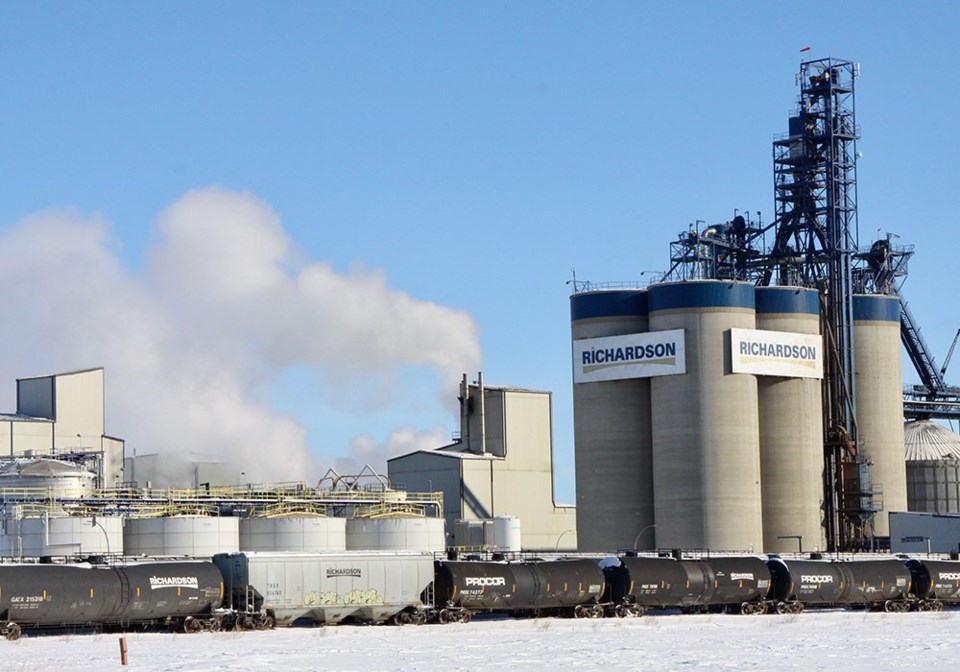WESTERN PRODUCER — Grain elevator companies, grain mills and canola crushers have struggled to find and keep employees for years.
The lack of available workers could soon get worse if the federal government follows through on its plan to mandate vaccinations at federally regulated workplaces.
The list of federally regulated companies includes a large portion of Canada's grain industry, such as elevators, feed mills, seed mills, seed-cleaning plants, railways and ports.
Most of those workplaces are in rural parts of Western Canada, where vaccination rates are lower. So, a percentage of employees at elevators or canola crushing plants may choose to quit their jobs or retire rather than get vaccinated.
Chris Vervaet, executive director of the Canadian Oilseed Processors Association, which represents 11 canola crushing plants on the Prairies and three crushing plants in Ontario and Quebec, confirmed that most parts of the oilseed processing sector are subject to the federal regulations and the labour code.
He said the companies in the association support vaccines, but requiring employees to get the jab is problematic.
"COPA and its members do agree that vaccines are the most effective way to protect against COVID … (but) mandating a vaccine certainly has the potential to impact the availability of labour in (what) is a pretty challenging time to get labour at these facilities."
In early December, the federal government announced a vaccine mandate for federally regulated industries. Employment and Social Development Canada said it would work rapidly to finalize the regulations, so the vaccine mandate would "come into force in early 2022."
The mandate would affect about 18,500 employers, including federal crown corporations, which together employ 955,000 people.
A percentage of those employees work at grain elevators, ports, grain mills and crushing plants. There are 441 licensed grain elevators in Canada. Assuming each elevator has 10 to 15 employees, the federal mandate would affect 4,000 to 6,000 workers — just at grain elevators.
Depending on vaccination rates, hundreds or thousands of grain industry workers might have to get the jab to keep their job.
The mandate hasn't happened ye,t but grain industry leaders believe it will soon.
"We are anticipating it, sometime over the winter period," Vervaet said.
Wade Sobkowich, executive director of the Western Grain Elevator Association, said companies in the WGEA support vaccinations, but threatening a worker's job to increase vaccination rates isn't the right policy.
"To require them to leave their employment because of that issue, we think that's the wrong place for that to come to a head," he said.
"The federal government is turning it into a workplace health and safety issue by mandating that employees of federally regulated companies be vaccinated…. Turning it into an occupational health and safety issue is problematic. They should be dealing with it (COVID) as a public health issue. Not using people's jobs, as leverage, to get needles into arms."
If Ottawa proceeds with the mandate, the grain sector is facing a couple of unknowns:
-
How many employees will get vaccinated to keep their jobs?
-
How many will quit or retire to avoid getting the jab?
Sobkowich didn't have figures on the percentage of grain elevator employees who are vaccinated in Western Canada, but in some regions of the Prairies the percentage could be relatively low. In parts of Manitoba, such as Altona and Winkler, the vaccination rate is 25 to 50 percent. Potentially, 50 to 75 percent of workers at a grain elevator near Winkler could be unvaccinated.
"It depends on the region. In southern Manitoba it would be higher (the percentage of unvaccinated workers)," he said.
"Elevators in Alberta would (also) be higher."
Even if a small percentage of workers quit or retire because of the mandate, it could have a major impact on grain movement and grain processing in Canada because the labour market is extremely tight.
As of Jan. 28, Richardson International had 79 job postings on its website. Those jobs aren't all at elevators, grains mills or crushing plants, but it's difficult to find employees right now in rural Canada.
"Even before COVID and in the midst of COVID … labour availability has always been an issue," Vervaet said.
"Keeping that labour is also a challenge."
Associations and companies in the grain sector are hoping the government includes a testing option in the regulation, where employees who refuse the vaccine can keep their job if they get tested several times per week.
For now, that may not be an option.
"It's all so very cloudy. The last document we received … they didn't even have testing as part of the protocol. It was simply mandated vaccines," said Marilyn Britton, human resources manager with Grain Millers, an oat-milling firm that employs more than 200 people in Yorkton, Sask.
"That's what we were gearing towards — how we were going to test and who would pay for that."
It's possible the federal government might reconsider the black and white mandate and include testing. The WGEA and other groups have been pushing for testing, which is an option at many other workplaces.
Manitoba teachers, for example, must be vaccinated or get frequent COVID tests to keep their jobs.
If testing isn't an option, it's possible that more workers at elevators, ports, mills and crushing plants will walk away from their jobs.
"To lose a percentage of the workforce … could and will have supply chain impacts," Sobkovich said.
"These aren't jobs that anybody can do. It takes training and technical expertise…. The level of concern is really unknown … because we don't have a good sense of how many workers will ultimately go ahead and get vaccinated."
The Western Producer contacted Employment and Social Development Canada for this story.
When they respond, their comments will be added to this article.




